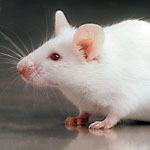Bullied mice show how brain reacts to social stress
Any bully's victim knows the experience can cause lingering fear. Now scientists watching big mice intimidate small ones have discovered the stress spurs genetic changes in the brain a finding that may help research into depression and other mental illnesses.

The experiment suggests a part of the brain linked to addiction also plays a previously unsuspected role in illnesses characterized by chronic anxiety and social withdrawal, Texas researchers report Thursday in the journal Science.
In fact, a substance produced in the brain, called BDNF, seems to be the culprit, controlling whether the bullied mice turned into fearful hermits or not.
"This is a fascinating observation," said Dr. Thomas Insel, director of the National Institute of Mental Health, which helped fund the work.
Neuroscientists at the University of Texas Southwestern Medical Center wanted to test the role of the brain's "reward pathway" in depression-like behavior. This brain circuitry is involved in emotional learning, and recognizing pleasure, and thus has a role in addiction. But people with major depression become almost numb, unable to experience pleasure, suggesting another role for the reward pathway.
Enter the mice, normally sociable creatures who quickly determine their pecking order, steering clear of aggressors in favor of friendlier company.
The Texas researchers subjected some small brown mice to intimidation more intense than they'd face in the wild: Each was placed for five minutes in the cage of a particularly aggressive, large white mouse, who battled the little one into a corner. Then, researchers divided the cage with a perforated, plexiglass divider for 24 hours so the little mouse was in no physical danger, but saw and smelled the aggressor. For 10 days, each little mouse met a new bully.
The bullied mice emerged drastically cowed. Four weeks later, they still fearfully withdrew from even presumably friendly little mice, reports AP.
O.Ch.
Subscribe to Pravda.Ru Telegram channel, Facebook, RSS!


